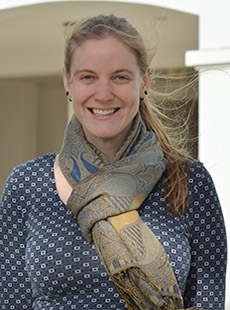Dr. Amy Maas

Amy is a comparative physiologist and biological oceanographer whose research addresses fundamental questions about how the environment influences the distribution and biology of marine invertebrates. Based on this understanding she works to identify how climate change will impact biogeochemical cycling. Using transcriptomics, microscopy and comparative physiology, one major focus of Amy's studies is understanding how thecosome pteropods respond to ocean acidification. Her current research projects also include studying pteropod distribution and seasonality at the BATS site, explorations of circadian rhythms and diel vertical migration in open water zooplankton to better understand how environmental changes impact carbon flux, and comparative transcriptomics of multiple plankton species.
Amy received her PhD from the University of Rhode Island in 2011, where she worked in Antarctica and at sea in the Eastern Pacific exploring the impacts of climate-related variables on pteropods living in extreme environments. As a Postdoctoral Scholar/Investigator at Woods Hole Oceanographic Institution she worked in the Biology Department studying regional and seasonal patterns of pteropod metabolic and transcriptomic sensitivity to ocean acidification (2011-2015). Prior to joining BIOS in 2015 Amy was also jointly appointed at the University of Connecticut Marine Science and Technology Center as an Assistant Research Scientist.
Research interests:
Impacts of climate change on the physiology and distribution of zooplankton, genetic response of pteropods to conditions of ocean acidification, RNA sequencing of zooplankton, carbon flux, circadian rhythms, diel vertical migration
Educational Background:
University of Rhode Island, RI 2006 - 2011
- PhD
EPSCOR Fellowship 2009 - 2009
Hiram College, OH 2002 - 2006
- B.A. in Biology, with honors
Download Dr. Amy Maas' CV
Further Information:
Invertebrate Physiology Lab
Selected Publications
A.E. Maas, G.L. Lawson, A.J. Bergan and A.M. Tarrant. (2018) Exposure to CO2 influences metabolism, calcification, and gene expression of the thecosome pteropod Limacina retroversa. Journal of Experimental Biology 221(3). Doi: 10.1242/jeb.164400
Z.A. Wang, G.L. Lawson, C. Pilskaln, A.E. Maas. (2017) Seasonal controls of aragonite saturation states and impacts on pteropod abundance in the Gulf of Maine. AGU Oceans 122(1): 372-389.
A.E. Maas, G.L. Lawson, Z.A. Wang. (2016) The metabolic response of thecosome pteropods from the North Atlantic and North Pacific Oceans to high CO2 and low O2. Biogeosciences Discussions 13: 6191-6210.
A.E. Maas, I.T. Jones, A.M. Reitzel, A.M. Tarrant. (2016) Daily cycle in oxygen consumption by the sea anemone Nematostella vectensis Stephenson. Biology Open 5(2).
A.A. Thabet, A.E. Maas, G.L. Lawson, A.M. Tarrant. (2015) Life cycle and early development of the thecosomatous pterapod Limacina retroversa in the Gulf of Maine, includng the effect of elevated CO2 levels. Marine Biology 162(11): 2235-2249.
A.E. Maas, G.L. Lawson, A.M. Tarrant. (2015) Transcriptome-wide analysis of the response of the thecosome pteropod Clio pyramidata to short-term CO2 exposure. Comparative Biochem and Phys Part D 16: 1-9.
A.E. Maas, S.L. Frazar, D.M. Outram, et. al. (2014) Fine-scale vertical distribution of macroplankton and micronekton in the Eastern Tropical North Pacific in association with an oxygen minimum zone. J. Plankton Res. 36(6): 1557-1575.
A.E. Maas, L. Blanco-Bercial, G.L. Lawson. (2013) Reexamination of the species assignment of Diacavolinia pteropods using DNA barcoding. PLoS ONE 8(1): e53889.
A.E. Maas, K.F. Wishner, B.A. Seibel. (2012) Metabolic suppression in thecosomatous pteropods as an effect of low temperature and hypoxia in the eastern tropical North Pacific. Mar Biol 159(9): 1955-1967.
B.A. Seibel, A.E. Maas, H.M. Dierssen. (2012) Energetic plasticity underlies a variable response to ocean acidification in the pteropod Limacina helicina antarctica. PLoS ONE 7(4): e30464.
Contact Info
Dr. Amy Maas
Associate Scientist
Assistant Professor
Amy.Maas@bios.asu.edu
Tel: 441-297-1880 x131
